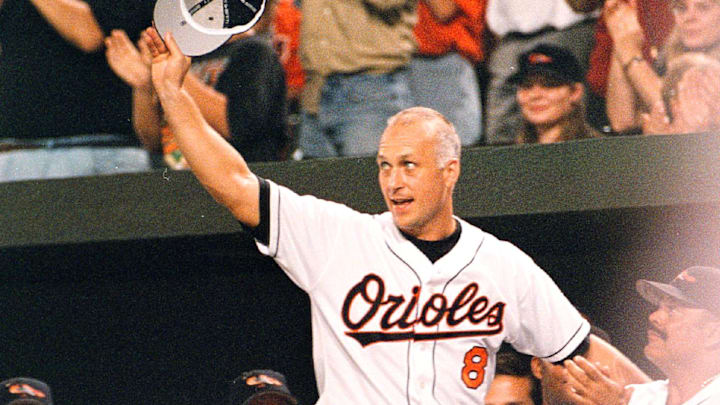Cal Ripken Jr was baseball's Ironman and on September 6, 1995, he broke Lou Gehrig's "unbreakable" record when he played his 2,131st consecutive game. That achievement cannot be commended enough, and Ripken has deserved all of the accolades he has received, but there is one thing that gets overlooked. 2,131 gets all of the attention but Ripken's record streak continued three more years. Ripken finally brought the streak to an end 25 years ago today, on 9/19/98 at 2,632 games.
That means that Ripken extended his own record 501 times. To put that into context, Ripken's 501 consecutive games after breaking Gehrig's record would be the 40th longest streak in MLB history. Miguel Cabrera is the only active player to have played more total games (2,787) than Ripken's streak. As amazing as the streak seems, Ripken always downplayed it by suggesting that all he did was show up to work every day.
Cal Jr played every game for about 16 years. During that time, Ripken was the Rookie of the Year (1982), two-time MVP (1983, 1991), World Series Champion (1983), eight-time silver slugger (1983-86, 1989, 1991, 1993-94), two-time gold glove winner (1991-92), Roberto Clemente Award recipient (1992) and a 16-time all-star.
He also set the record for consecutive innings played during the streak. Ripken played 8,264 consecutive innings between June 5, 1982, and September 14, 1987. That's over five straight seasons. Cal played with 150 different Orioles and had eight different managers during his streak. He also faced 526 different pitchers in that time.
While the majority of the streak can be attributed to "The Ripken Way", a strong work ethic instilled in him by his father, Cal Ripken Sr, there was also a bit of luck. Both of Ripken's kids, Rachel and Ryan, were born on off days. Cal famously never answered the question about what he would have done had his kids been born on a game day. He was also lucky to avoid any serious injury during his 21 year career.
He did play through several injuries that some thought would have ended the streak, to include sprained ankles and knees, and a broken nose suffered during a team photograph in the 1996 all-star game. But Ripken played through all of those injuries, including playing in the all-star game just a short time after breaking his nose.
Finally on September 20, 1998, Cal Ripken Jr went into manager Ray Miller's office and said it was time. At 38 years of age, Ripken decided he needed a day off. Ryan Minor played third base and batted fourth for the Orioles in a 5 - 4 loss to the New York Yankees as Ripken watched from the bench. Ripken went on to play three more season for the Birds and was a first ballot hall of famer.
The streak is still commonly brought up when people discuss the most unbreakable records in baseball. There are numerous records that are definitely safe such as Cy Young's 511 career wins and 749 complete games, Walter's Johnson's 110 career shutouts and Johnny Vander Meer's two consecutive no-hitters.
Offensive records that may never be topped include Fernando Tatis's two grand slams in one inning, Joe Sewell only striking out three times in a season as a qualified hitter and Hugh Duffy's .440 batting average in 1894. As tempting as it is to say that Ripken's streak will never be broken, people said the same thing about Lou Gehrig's streak.
In today's game you rarely see people play all 162 games in a season, but things change. It took 66 years for a player to surpass Gehrig's streak. Cal Jr's streak may stand the test of time, but records are made to be broken.
